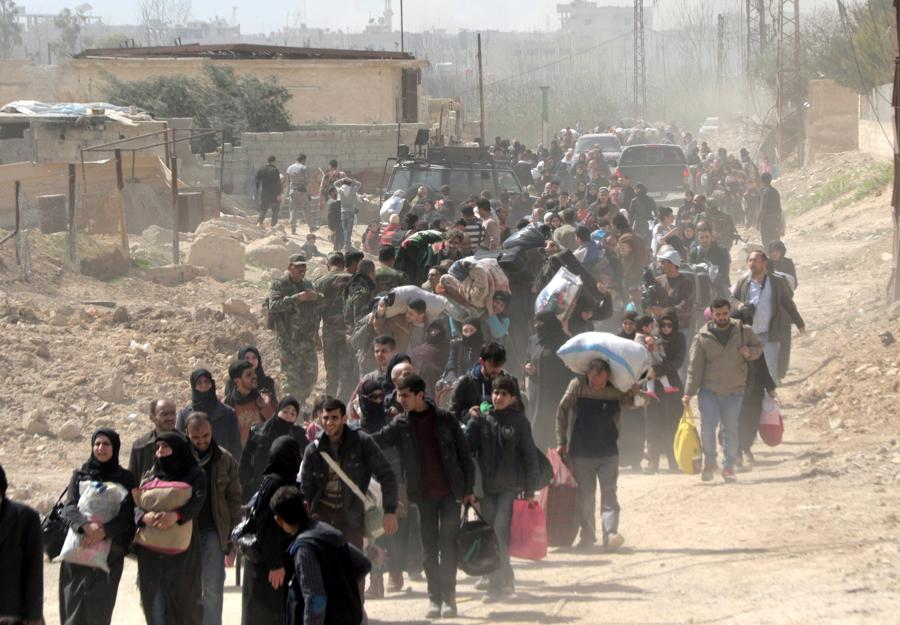
BEIRUT — Tens of thousands of terrified men, women, and children streamed out on foot and in pickup trucks Thursday from besieged enclaves on two fronts, fleeing bombings from the Syrian military near the capital, Damascus, and Turkish troops in the country’s north.
It was the largest single-day exodus of civilians from fighting in Syria’s civil war and a reminder of how the conflict that sparked a humanitarian catastrophe continues to hit new lows as it enters its eighth year.
The flight of an estimated 42,000 civilians came as their attackers — Syrian government troops, backed by Russian aircraft, and Turkish forces — pushed their way into civilian centers, in strategic military advances that could turn the page on some of the most volatile flash points of the conflict.
Near the capital, Damascus, the Syrian government is chipping away at one of the largest and most significant opposition bastions since the early days of the rebellion — communities where some 400,000 people are estimated to be holed up.
Since mid-February, Syrian troops have targeted the capital’s sprawling eastern Ghouta region with shells, airstrikes and, at times, even toxic gas, according to opposition medics. They are now in control of the majority of the enclave that had been in rebel hands since 2012.
Over the weekend, troops backing President Bashar Assad divided the enclave into three sectors, isolating the major urban centers and enabling a swift advance.
Starting Wednesday night, intense shelling and aerial strikes paved the way for a ground advance on Hamouria, a town in the region’s isolated southern pocket. It also triggered a mass exodus.
At least 10,000 men, women and children emerged from Hamouria and nearby opposition towns, carrying mats and other possessions that sometimes poked out of suitcases. An elderly man pushed a bicycle piled with belongings. A shepherd brought his herd of sheep and cattle with him through the corridor set up by government forces.
‘‘What other choice do people have?’’ said a doctor from Hamouria, who left a week earlier for another rebel-held town after his clinic and home were destroyed. ‘‘It is either death or exiting,’’ said the doctor, who spoke on condition of anonymity to protect his identity and the safety of his family.
The Syrian Observatory for Human Rights monitoring group estimated that some 12,500 civilians fled eastern Ghouta. Later the government said it had seized Hamouria, but activists said opposition forces were fighting back.
The Observatory also said that government forces targeted a column of civilians fleeing Hamouria before dawn Thursday, wounding several people, and that 26 people were killed in government strikes on the town Wednesday.
State-run Al-Ihkbariya TV said civilians would be taken to a center for identification and for humanitarian aid. The pro-government Al-Mayadeen TV showed buses waiting to transport those who fled.
Meanwhile, to the north, tens of thousands fled the Turkish military offensive on the Syrian Kurdish-controlled enclave of Afrin. Turkey considers the Kurdish militia a threat to its national security.
Turkish forces tightened their siege of Afrin in recent days. On Wednesday, after Turkish President Recep Tayyip Erdogan said he hoped to encircle the town by the evening, shells slammed into the town center after dusk, killing at least seven people and deepening the fear of a ground assault.
The escalation drove people into shelters overnight, followed by the mass exodus of an estimated 30,000 people, according to the Syrian Observatory for Human Rights.
Trucks, brimming with furniture and bags lined the road out of Afrin along with civilians on foot, lugging a few belongings. Some residents, speaking to Al-Mayadeen TV, said they were going to neighboring villages to get food and bread and hoped to return to Afrin.
Erdogan, addressing the European Parliament on Thursday, said he would not halt the military campaign against the Kurdish People’s Protection Units, known as the YPG, which controls Afrin.
‘‘We won’t leave until our job is done,’’ he said.
Thursday’s civilian exodus underscored the intractability of a conflict that has invited world powers to stake out their spheres of influence in the fragmented country.
Throughout the conflict, entire neighborhoods and towns have been cleared of their residents amid intense fighting, departures that took place over days and weeks. The chaotic scenes Thursday were the most intense for a single day and were reminiscent of the floods of refugees trekking across Europe in late 2016.
Seven years of bloodletting have killed some 450,000 people and displaced millions.



